“In vain they hid their combs away up in hollow trees and in the clefts of high rocks. The bears, which are very fond of honey, were ever on the lookout for it, and were very clever in getting it when once they found where it was hidden away. Birds with long beaks would suck it out, and even the little squirrels were always stealing it. The result was that whole swarms often starved in the long winters, because all their honey, which is their winter food, was stolen from them. The bees were in danger of being destroyed. They gave up working in great numbers together, and scattered into little companies, and in the most secret places tried to store away a little honey, just enough to keep them alive from season to season. But even these little hives were often discovered and the honey devoured.
“Things had come to such a pass with them that they had almost given up hope of lasting much longer.
“Fortunately for them, word was circulated that Wakonda, the strong spirit—the one who sent the mosquitoes—was coming around on a tour, to see how everything was progressing. He was greater than even Nanahboozhoo, and was perhaps a relative of his, but he very seldom appeared, or did anything for anyone. However, it happened that he had this year left his beautiful home at Spirit Lake and was journeying through the country, and he was willing to help all who were in real distress.
“So the bees resolved to apply to him for help. Wakonda received them very graciously, and ate heartily of the present of beautiful honey which some of them had made and had succeeded in keeping out of the way of bears and their other enemies.
“When his feast of honey was over he listened to their tales of sorrow and woe. He was indignant when he heard of the numbers of their enemies, and of the persistency of their attacks upon such industrious little creatures.
“For a time Wakonda was uncertain as to the best method to adopt to help them. He dismissed them for that day, and told them to come again on a day he mentioned, saying that by that time he would know just what to do—for help them he would. The bees were so delighted with this news that they could not keep it to themselves but must go and tell their cousins, the wasps and hornets, and even bumblebees.
“When the appointed time arrived the bees were on hand—and so were the wasps, hornets, and bumblebees. Wakonda welcomed the bees most kindly, but was a little suspicious about their visitors, and he asked some sharp questions. But the bees were in such good humor about the help that was coming that they did not refer to the bad habits of their cousins at all. Then Wakonda made a speech to the bees, and told them how much he loved them for their industrious habits, which he wished all creatures had. He praised them for the fact that, instead of idly wasting the summer days, they used them in gathering up food for the long, cold winter.




